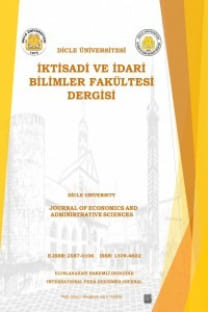PETROL FİYATLARI İLE HİSSE SENETLERİ FİYATLARI ARASINDAKİ İLİŞKİ: BIST SEKTÖRLERİNE YÖNELİK BİR ANALİZ
BIST, Hisse Senedi, Granger Nedensellik Testi
THE RELATIONSHIP BETWEEN OIL PRICES AND STOCK PRICES: EVIDENCE FROM BIST SECTORS
BIST, Stock, Granger Causality Test,
___
- Arouri , M. E. H., Bellalah, M., & Nguyen, D. K. (2011). Further evidence on th e responses of stock prices ın gcc countriesto oil price shocks, International journal of business, 16(1), 89-102.
- Basher, S. A., & Sadorsky, P. (2006). Oil price risk and emerging stock markets, Global finance journal, 17, 224-251.
- Bittlingmayer, G. (2005). Oil and stocks: Is it war risk?. University of kansas manuscript.
- Chen, N., Roll, R., & Ross, S. A. (1986). Economic forces and the stock market. The journal of business, 59(3), 383-403.
- Chittedi, K. R. (2012). Do oil prices matters for ındian stock markets? An empirical analysis. Journal of applied economics and business research, 2(1), 2-10.
- Engle, R.F., & Granger, C.W.J. (1987). Co-Integration and error correction: representation, estimation, and testing. Econometrica, (55), 251-76.
- Friedrichs, J. (2011). Peak energy and climate change: The double bind of postnormal science. Futures, 43, 469-477.
- Granger, C.W. J. (1969). Investigating causal relations by econometric models and crossspectral methods. Econometrica, 37, 424–438.
- Güler, S., Tunç , R., Orçun, & Ç. (2010). Petrol fiyat riski ve hisse senedi fiyatları arasındaki ilişkinin belirlenmesi: Türkiye'de enerji sektörü üzerinde bir uygulama. Journal of Atatürk University faculty of economics and administrative sciences, 24(4), 297-315.
- Hamilton, J . D. (2003). What ıs an oil shock?. Journal Of Econometrics, 113, 363-398.
- Huang, R. D., Masulis, R. W., & Stoll, H. R. (1996). Energy shocks and financial markets, Journal of futures markets, 16, 1-27.
- İşcan, E., (2010). Petrol fiyatının hisse senedi piyasası üzerindeki etkisi. Maliye dergisi, 158, 607-617.
- Johansen, S. (1988). Statistical Analysis of Cointegration Vectors. Journal of economic dynamics and control, 12, 293-300.
- Johansen, S., & Juselius, K. (1990). Maximum likelihood estimation and ınferences on cointegration with applications to the demand for money. Oxford bulletin of economics and statistics, 52, 169–210.
- Jones, C.M., & Kaul, F. (1996). Oil and the stock markets. The journal of finance, 51(2) , 463- 491.
- Kapusuzoğlu, A. (2011). Relationships between oil price and stock market: an empirical analysis from ıstanbul stock exchange (ISE). International journal of economics and finance, 3(6), 99-106.
- Maghyereh, A., & Al-Kandari, A. (2007). Oil prices and stock markets in gcc countries: New Evidence from nonlinear cointegration analysis. Managerial finance, 33 (7), 449-460.
- Maghyereh, A. (2004). Oil price shocks and emerging stock markets: a generalized VAR approach. International journal of applied econometrics and quantitative Studies, 1 (2), 27-40.
- Malik, F., & Hammoudeh, S. (2007). Shock and volatility transmission in the oil, us and gulf equity markets, International review of economics and finance, 16, 357-368.
- Narayan, P.K., & Narayan, S. (2010). Modelling Th e Impact Of Oil Prices On Vietnam's Stock Prices. Applied Energy, 87, 356-361.
- Sadorsky, P. (1999). Oil Price Shocks and Stock Market Activity. Energy Economics, 2, 449-469.
- Şan, F. B. (2014). Hisse senedi piyasasına katılma eğilimlerine etki eden davranışsal faktörler: işletme bölümü öğrencilerine üzerine bir araştırrna. Unpublished master's thesis, Muğla Sıtkı Koçman university ınstitute of social sciences, Muğla.
- Şener, S., Yılancı, V., & Tıraşoğlu, M. (2013). Petrol fiyatları ile borsa İstanbul'un kapanı fiyatları arasındaki saklı ilişkinin analizi. Selçuk üniversitesi İİBF sosyal ve ekonomik araştırmalar dergisi, 26, 231-248.
- Takim, A. (2010). Türkiye’de GSYİH ile ihracat arasındaki ilişki: Granger nedensellik testi. Atatürk Üniversitesi Sosyal Bilimler Enstitüsü Dergisi, 14(2), 315-330.
- ISSN: 1309-4602
- Yayın Aralığı: Yılda 2 Sayı
- Başlangıç: 2011
- Yayıncı: Dicle Üniversitesi
ÇALIŞAN YOKSULLARIN SOSYAL DESTEK SİSTEMLERİNİN İNCELENMESİ
Abdulkadir İNAK, Bedrettin KESGİN
MEREC-CORR VE SAW TEMELLİ LOJİSTİK PERFORMANS DEĞERLENDİRME
YABANCI TURİSTLERİN KİŞİLİK ÖZELLİKLERİNİN MEMNUNİYET VE SADAKAT DÜZEYLERİNE ETKİSİ: ALANYA ÖRNEĞİ
TÜRK ANAYASA MAHKEMESİNİN SOSYAL MEDYA KULLANIMI: TWİTTER PAYLAŞIMLARININ İÇERİK ANALİZİ
OTANTİK LİDERLİK, YETENEK YÖNETİMİ VE İŞ-YAŞAM DENGESİ ARASINDAKİ ETKİLEŞİM
NAKDÎ SERMAYE AKTARIMI VE BORÇLU PORTFÖYÜ AÇISINDAN PARA VAKIFLARI: İSTANBUL ÖRNEĞİ (1710-1715)
ÇATIŞMA NEDENLERİ VE YÖNETİMİNİN HASTANE YÖNETİCİLERİ BAKIŞ AÇISIYLA DEĞERLENDİRİLMESİ
COVID 19 SÜRECİNDE MADEN İŞÇİLERİNİN ÇALIŞMA KOŞULLARI ÜZERİNE BİR ARAŞTIRMA: SOMA ÖRNEĞİ
Emel ÖZKAN, Aytül GÜNEŞER DEMİRCİ
TÜRKİYE VE BRICS ÜLKELERİNDE ENERJİ TÜKETİMİNİN EKONOMİK REFAHA ETKİSİ
